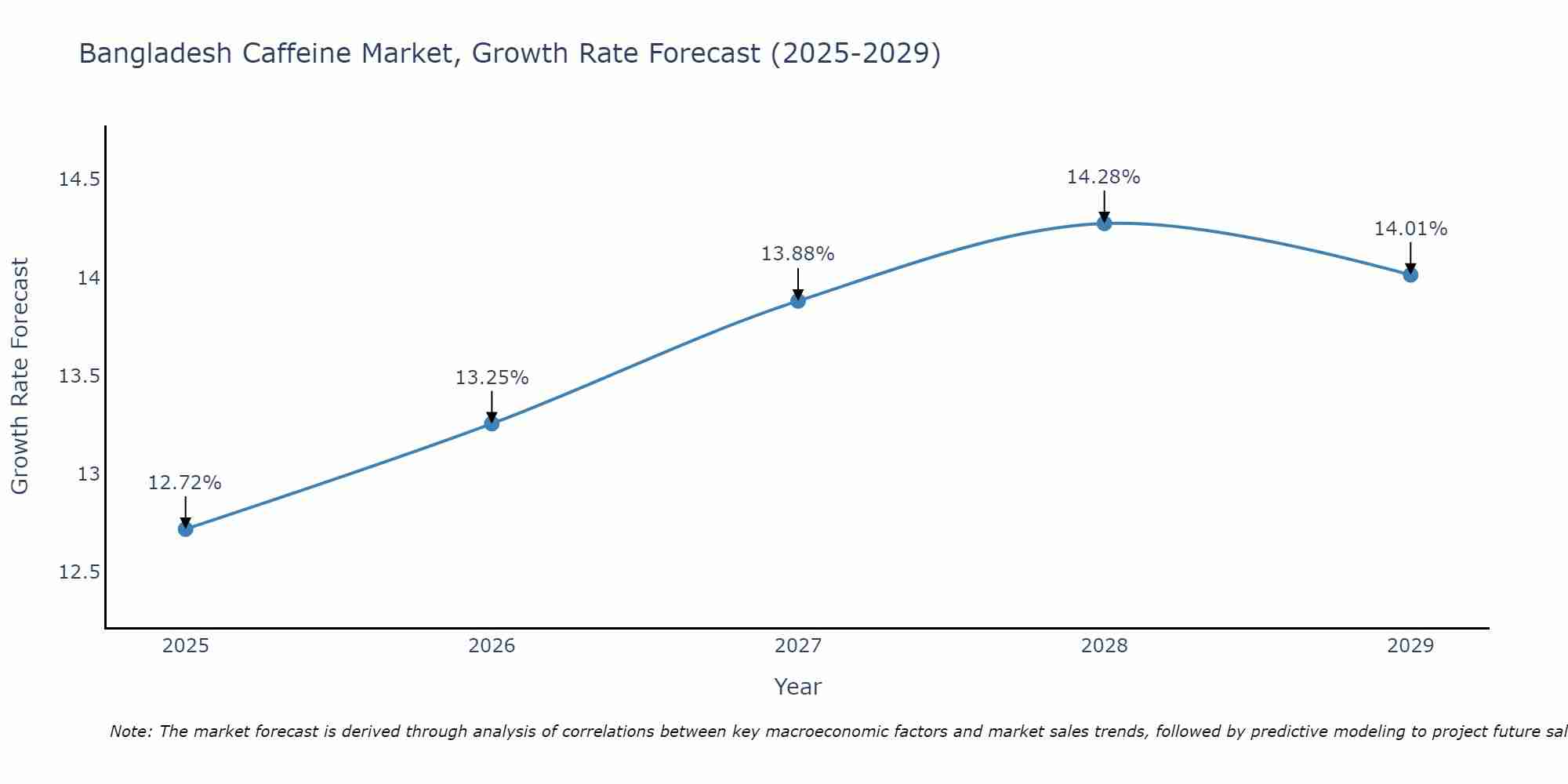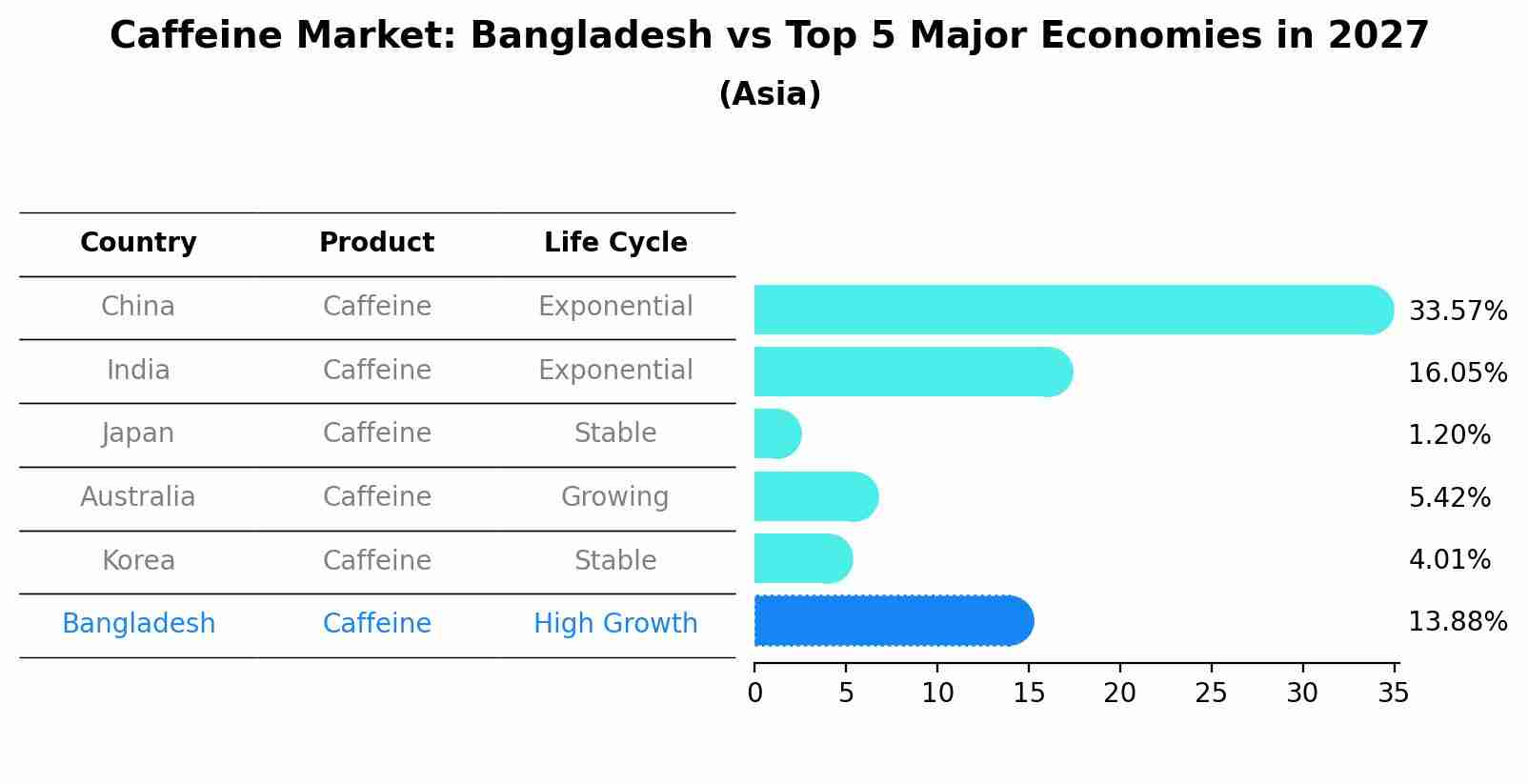Bangladesh Caffeine Market (2025-2031) Outlook | Industry, Analysis, Companies, Growth, Forecast, Revenue, Share, Value, Size & Trends
| Product Code: ETC110031 | Publication Date: Jun 2021 | Updated Date: Apr 2025 | Product Type: Report | |
| Publisher: 6Wresearch | Author: Ravi Bhandari | No. of Pages: 70 | No. of Figures: 35 | No. of Tables: 5 |
Bangladesh Caffeine Market Size Growth Rate
The Bangladesh Caffeine Market is projected to witness mixed growth rate patterns during 2025 to 2029. The growth rate begins at 12.72% in 2025, climbs to a high of 14.28% in 2028, and moderates to 14.01% by 2029.

Caffeine Market: Bangladesh vs Top 5 Major Economies in 2027 (Asia)
The Caffeine market in Bangladesh is projected to grow at a high growth rate of 13.88% by 2027, within the Asia region led by China, along with other countries like India, Japan, Australia and South Korea, collectively shaping a dynamic and evolving market environment driven by innovation and increasing adoption of emerging technologies.

Bangladesh Caffeine Market Overview
The Bangladesh Caffeine Market is experiencing steady growth, supported by the rising consumption of caffeinated beverages and the growing awareness regarding the health benefits associated with moderate caffeine intake. With changing lifestyles and preferences, there`s a growing inclination towards energy drinks, ready-to-drink coffee, and other caffeinated products, driving the demand for caffeine in the market.
Drivers of the market
The Bangladesh caffeine market is experiencing robust growth, driven by several key factors. One of the primary drivers is the increasing consumption of caffeinated beverages such as tea and coffee among the Bangladeshi population. Caffeine is a widely consumed psychoactive substance known for its stimulating effects on the central nervous system, which helps improve alertness and mental focus. With the growing urbanization and changing consumer lifestyles in Bangladesh, the demand for caffeinated products is on the rise. Additionally, the growing popularity of energy drinks and ready-to-drink coffee products is further fueling market growth in the country.
Challenges of the market
The Bangladesh Caffeine market grapples with fluctuations in coffee consumption patterns and health concerns associated with excessive caffeine intake. Additionally, import dependency for caffeine sources and changing consumer preferences towards healthier alternatives pose challenges for market growth.
Government Policy of the market
Bangladesh caffeine market has seen notable growth attributed to the rising consumption of caffeinated beverages and the expanding food and beverage industry. Government regulations ensuring product safety and labeling standards have instilled consumer confidence, supporting market growth. Additionally, initiatives promoting agricultural productivity and quality improvement have contributed to the availability of high-quality caffeine sources in the country.
Key Highlights of the Report:
- Bangladesh Caffeine Market Outlook
- Market Size of Bangladesh Caffeine Market, 2024
- Forecast of Bangladesh Caffeine Market, 2031
- Historical Data and Forecast of Bangladesh Caffeine Revenues & Volume for the Period 2021-2031
- Bangladesh Caffeine Market Trend Evolution
- Bangladesh Caffeine Market Drivers and Challenges
- Bangladesh Caffeine Price Trends
- Bangladesh Caffeine Porter's Five Forces
- Bangladesh Caffeine Industry Life Cycle
- Historical Data and Forecast of Bangladesh Caffeine Market Revenues & Volume By Type for the Period 2021-2031
- Historical Data and Forecast of Bangladesh Caffeine Market Revenues & Volume By Natural Caffeine for the Period 2021-2031
- Historical Data and Forecast of Bangladesh Caffeine Market Revenues & Volume By Synthetic Caffeine for the Period 2021-2031
- Historical Data and Forecast of Bangladesh Caffeine Market Revenues & Volume By Applications for the Period 2021-2031
- Historical Data and Forecast of Bangladesh Caffeine Market Revenues & Volume By Pharmaceuticals for the Period 2021-2031
- Historical Data and Forecast of Bangladesh Caffeine Market Revenues & Volume By Food for the Period 2021-2031
- Historical Data and Forecast of Bangladesh Caffeine Market Revenues & Volume By Beverages for the Period 2021-2031
- Historical Data and Forecast of Bangladesh Caffeine Market Revenues & Volume By Flavours and Fragrances for the Period 2021-2031
- Bangladesh Caffeine Import Export Trade Statistics
- Market Opportunity Assessment By Type
- Market Opportunity Assessment By Applications
- Bangladesh Caffeine Top Companies Market Share
- Bangladesh Caffeine Competitive Benchmarking By Technical and Operational Parameters
- Bangladesh Caffeine Company Profiles
- Bangladesh Caffeine Key Strategic Recommendations
Frequently Asked Questions About the Market Study (FAQs):
- Single User License$ 1,995
- Department License$ 2,400
- Site License$ 3,120
- Global License$ 3,795
Search
Thought Leadership and Analyst Meet
Our Clients
Related Reports
- Afghanistan Apparel Market (2026-2032) | Growth, Outlook, Industry, Segmentation, Forecast, Size, Companies, Trends, Value, Share, Analysis & Revenue
- Canada Oil and Gas Market (2026-2032) | Share, Segmentation, Value, Industry, Trends, Forecast, Analysis, Size & Revenue, Growth, Competitive Landscape, Outlook, Companies
- Germany Breakfast Food Market (2026-2032) | Industry, Share, Growth, Size, Companies, Value, Analysis, Revenue, Trends, Forecast & Outlook
- Australia Briquette Market (2025-2031) | Growth, Size, Revenue, Forecast, Analysis, Trends, Value, Share, Industry & Companies
- Vietnam System Integrator Market (2025-2031) | Size, Companies, Analysis, Industry, Value, Forecast, Growth, Trends, Revenue & Share
- ASEAN and Thailand Brain Health Supplements Market (2025-2031) | Strategy, Consumer Insights, Analysis, Investment Trends, Opportunities, Growth, Size, Share, Industry, Revenue, Segments, Value, Segmentation, Supply, Forecast, Restraints, Outlook, Competition, Drivers, Trends, Demand, Pricing Analysis, Competitive, Strategic Insights, Companies, Challenges
- ASEAN Bearings Market (2025-2031) | Strategy, Consumer Insights, Analysis, Investment Trends, Opportunities, Growth, Size, Share, Industry, Revenue, Segments, Value, Segmentation, Supply, Forecast, Restraints, Outlook, Competition, Drivers, Trends, Demand, Pricing Analysis, Competitive, Strategic Insights, Companies, Challenges
- Europe Flooring Market (2025-2031) | Outlook, Share, Industry, Trends, Forecast, Companies, Revenue, Size, Analysis, Growth & Value
- Saudi Arabia Manlift Market (2025-2031) | Outlook, Size, Growth, Trends, Companies, Industry, Revenue, Value, Share, Forecast & Analysis
- Uganda Excavator, Crane, and Wheel Loaders Market (2025-2031) | Strategy, Consumer Insights, Analysis, Investment Trends, Opportunities, Growth, Size, Share, Industry, Revenue, Segments, Value, Segmentation, Supply, Forecast, Restraints, Outlook, Competition, Drivers, Trends, Demand, Pricing Analysis, Competitive, Strategic Insights, Companies, Challenges
Industry Events and Analyst Meet
Whitepaper
- Middle East & Africa Commercial Security Market Click here to view more.
- Middle East & Africa Fire Safety Systems & Equipment Market Click here to view more.
- GCC Drone Market Click here to view more.
- Middle East Lighting Fixture Market Click here to view more.
- GCC Physical & Perimeter Security Market Click here to view more.
6WResearch In News
- Doha a strategic location for EV manufacturing hub: IPA Qatar
- Demand for luxury TVs surging in the GCC, says Samsung
- Empowering Growth: The Thriving Journey of Bangladesh’s Cable Industry
- Demand for luxury TVs surging in the GCC, says Samsung
- Video call with a traditional healer? Once unthinkable, it’s now common in South Africa
- Intelligent Buildings To Smooth GCC’s Path To Net Zero


















